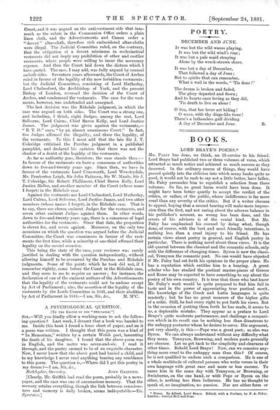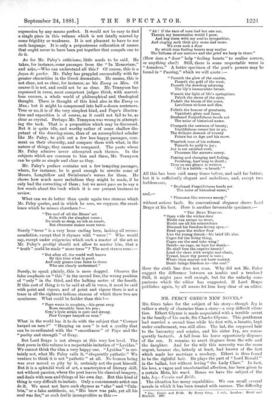BOOKS.
LORD BRAYE'S POEMS.*
Ma. PALEY has done, we think, an ill-service to his friend. Lord Braye had published two or three volumes of verse, which attracted as much notice and achieved as much success as they deserved. In the ordinary course of things, they would have- passed quietly into the oblivion into which many books quite as good, it would not be rash to say not a little better, have fallen. Mr. Paley persuades him to republish a selection from these volumes. So far, no great harm would have been done. It might have been better quietly to accept the verdict of the critics, or rather, of the public, whose indifference is far more cruel than any severity of the critics. But if a writer chooses to appeal, hoping that a second hearing will make more impres- sion than the first, and not caring about the adverse balance in his publisher's account, no wrong has been done, and the errors of his advisers is of the venial kind. But Mr. Paley has emphasised his counsel by doing what, though done, of course, with the best and most friendly intentions, is nothing less than a cruel injury to his friend. He has certain views about poetry in general, and English poetry in particular. There is nothing novel about these views. It is the old quarrel between the classical and the romantic schools, only with the difference of changing times. Byron is now the classi- cal, Tennyson the romantic poet. No one would have objected if Mr. Paley had set forth his opinions in the proper place. He has a reputation which entitles him to a hearing. A great scholar who has studied the poetical master-pieces of Greece and Rome may be expected to have something to say about the poetry of his own country. It is true that those who best know Mr. Paley's work would be quite prepared to find him fail in taste and in the power of appreciating true poetical merit. His knowledge of the Greek and Latin languages is quite masterly ; but he has no great measure of the higher gifts of a critic. Still, he had every right to put forth his views. But in the occasion of putting them forth he has made, it seems to us, a deplorable mistake. They appear as a preface to Lord Braye's quite moderate performance, and challenge a compari- son which in its result can be nothing less than disastrous to the unhappy poetaster whom he desires to serve. His argument, put very shortly, is this :—Pope was a great poet ; so also was Byron. We can always understand without any difficulty what they mean. Tennyson, Browning, and modern poets generally are obscure. Let us get back to the simplicity and clearness of other times. Behold Lord Braye ! Now, can we conceive any- thing more cruel to the unhappy man than this ? Of course, he is not qualified to endure such a comparison. Ile is one of a whole multitude of cultured persons who write verses in their- own language with great ease and more or less success. To name him in the same day with Tennyson, or Browning, or Swinburne, on the one hand, or with Pope or Byron on the other, is nothing less than ludicrous. He has no thought to speak of, no imagination, no passion. Nor are either form or * Poem.. By Alfred, Lord Braye. Edited, with a Preface, by F. A, Paley,. London : George Bell and Sons.
expression by any means perfect. It would not be easy to find a single piece in this volume which is not fatally marred by some frigidity or weakness. It is not pleasant to have to use such language. It is only a preposterous collocation of names that ought never to have been put together that compels one to do it.
As for Mr. Paley's criticisms, little needs to be said. He takes, for instance, some passages from the "In Memoriam," and asks,—Who can understand all this ? Of course, this is a facon de parler. Mr. Paley has grappled successfully with far greater obscurities in the Greek dramatists. He means, this is not clear, not as clear, for instance, as his Essay on Man. Of course it is not, and could not be as clear. Mr. Tennyson has expressed in verse, most competent judges think, with marvel- lous success, a whole world of philosophical and theological thought. There is thought of this kind also in the Essay on Man; but it might be compressed into half-a-dozen sentences.
True or no, it is of the very simplest kind, and Pope's illustra- tion and exposition is of course, as it could not fail to be, as clear as crystal. Perhaps Mr. Tennyson was wrong in attempt- ing the task. That is a proposition which may be discussed. But it is quite idle, and worthy rather of some shallow dis- putant of the drawing-room, than of an accomplished scholar like Mr. Paley, to pick out a few less happy passages, com- ment on their obscurity, and compare them with what, in the nature of things, they cannot be compared. The poets whom Mr. Paley admixes never attempted such themes. In the subjects which are common to him and them, Mr. Tennyson can be quite as simple and clear as they.
Mr. Paley's preface contains not a few tempting passages, where, for instance, he is good enough to rewrite some of Messrs. Longfellow and Swinburne's verses for them. He shows how much more melodious they might be made, if he only had the correcting of them ; but we must pass on to say a few words about the book which it is our present business to review.
What can we do better than quote again two stanzas which Mr. Paley quotes, and in which he sees, we suppose, the excel- lence which he misses elsewhere ?—
" The soul of all the Muses' art Baits with the simplest verse ; No truth so deep, no wit so smart,
But clearness makes more terse.
Surely " terse " is a very lame ending here, lacking all recom- mendation, except that it rhymes with " verse ! " Who would say, except under exigencies which such a master of the art as Mr. Paley's protégé should not allow to master him, that a " truth " could be made "more terse " ? The next stanza runs :—
" But after all, the world well knows By this time what is good,
And only grants true fame to those Who are clearly understood."
Surely, to speak plainly, this is mere doggrel. Observe the false emphasis on " this " in the second line, the wrong position of " only " in the third, and the halting metre of the fourth. If this sort of thing is to be said at all in verse, it must be said with point and vigour, and of point and vigour there is not a trace in all the eighteen tedious stanzas of which these two are specimens. What could be feebler than this ?—
" Pope wrote in couplets,—his great song Runs smoothly from his pen ; Gray's lyric strain is pare and strong, Poor Cowper harped on men."
What in the world has it to do with the subject that "Cowper harped on men ?" "Harping on men" is not a quality that can be co-ordinated with the " smoothness " of Pope and the "purity and strength" of Gray.
But Lord Braye is not always at this very low level. The first poem in this volume is a respectable imitation of " Lycidas." We cannot think the idea a very happy one. "Lycidas " is cer- tainly not, what Mr. Paley calls it, "eloquently pathetic." We venture to think it is not " pathetic " at all. No human being was ever moved to pity by it, certainly not the poet himself. But it is a splendid work of art, a masterpiece of literary skill, not without passion, where the poet leaves his classical imagery, and deals with men and things of his own day. But this kind of thing is very difficult to imitate. Only a consummate artist can do it. We must not have such rhymes as " afar " and "Cala- bria," or a false antithesis, as, "His brow was pale, yet all his soul was fire," or such feeble incongruities as this :—
"Ah ! if the race of man had but one ear,
Therein my lamentation would I pour, And beg them with my soul to sympathise, And singing melt their pity more and more.
We ever seek a door By which true feeling hearts may realise The fullness of our sorrows and the grief we keep in store."
(How does a " door" help "feeling hearts" to realise sorrow, or anything else?) Still, there is some respectable verse in "Amadeus." A better specimen of the poet's powers may be found in "Passing," which we will quote :— "Passeth the glow of the sunrise, Passeth the gold of the west, Passeth the dewdrop adorning The lily's immaculate breast.
Waneth the light of life's springtime.
Paleth the sheen of the eyes, Fadeth the bloom of the roses, Loveliness sickens and dies.
Falleth the honour of greatness, Vanisheth glory and fame, Deafened Forgetfulness heeds not The noise of historical name.
Changeth the newness of beauty, Youthfulness comes but to go, The delicate damask of twenty Points but to Age and his snow.
Wearieth man of his sadness, Turneth he gaily to joy; Joy is not satisfied ever, Pleasures like sorrows annoy.
Passing and changing and fading, Perishing, hast'ning to death; Thus on our planet is written All is a bubble—a breath.'"
All this has been said many times before, and said far better; but it is sufficiently elegant and melodious, and, except two feeblenesses,
"Deafened Forgetfulness heeds not The noise of historical name," and,— " Pleasures like sorrows annoy,"
without serious fault. Its conventional elegance shows Lord Braye at his best. Here is another favourable specimen :—
"THE DEAD THIMS11.
"Open wide the wicker door
Birdie can escape no more, Husht are all his minstrelsies
Dimmed his freedom-loving eyes,—
Dead upon the wicker floor Lies the young thrush—his brief life o'er.
Cages for the living thing,
Cages ere the soul take wing !
Death—no cage, no bars for death—
He shall free the captive breath !
Load the slave with weight and chain, Tyrant, know thy power is vain ; Where thou mayeat not have control, Death brings freedom to—the soul."
Here the sixth line does not scan. Why did not Mr. Paley suggest the difference between an iambic and a trochee ? Still, it might pass well enough, but for the unlucky com- parisons which the editor has suggested. If Lord Braye publishes again, by all means let him keep clear of an editor.































 Previous page
Previous page